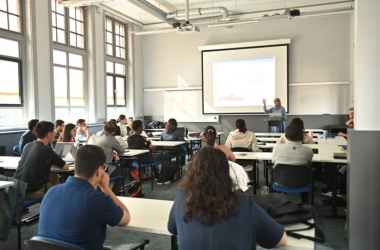Dutch Government Makes Study Financing More Accessible to EU Students
Dutch Government Makes Study Financing More Accessible to EU Students
Dutch Government Makes Study Financing More Accessible to EU Students

New Regulation Reduces Monthly Required Work Hours from 56 to 32
Citizens from Switzerland and European Union countries who are studying in the Netherlands are no longer required to work for 56 hours per month in order to be eligible for Dutch study financing. The Ministry of Education, Culture and Science of the Netherlands recently lowered the requirement to 32 hours per month, in line with a recommendation made by the Central Appeals Tribunal.
During the judgment of a lawsuit put forward by a Portuguese student, the tribunal found that the former 56-hour requirement was too strict. The court also noted that there was no legal basis for it, as European law has no fixed norm regarding this matter.
As a result, since 1 September, EU students who live in the Netherlands and work 32 hours per month are eligible to get study financing. Its value is equivalent to the basisbeurs available to Dutch students – that is, €110 per month for students who live with their parents and €439 per month for those living on their own. Additionally, the incentive also includes discounted rates or free access to public transportation.
Although 32 hours per month is the new requirement, there are exceptions, and students who can demonstrate that they have worked for 24 hours a month for more than six months are also eligible for the benefit. It is worth mentioning that if students obtain their diplomas within 10 years, the basic grant becomes a gift.
According to the president of Wittenborg, Peter Birdsall, the change to the requirement is positive, because working 56 hours a month while pursuing a full-time study programme can be detrimental to students. “The new requirement of eight hours a week combined with a full-time study programme is doable. So, I am very happy with it and I think it is a really great opportunity because European students want to work but they also want to study and graduate at the same pace.”
Birdsall points out that Wittenborg has recently launched a scholarship aimed at Dutch students and EU students of other nationalities (EEA) and also Ukraine, which amounts to €5,000 per year and considerably reduces their tuition fees to €4,800. He adds that although some members of the Dutch parliament have criticised the government’s study financing policies, these measures are very positive for the country. “Although eight hours a week is the minimum, most students will work more than that. The minimum amount will be done only by the top students who really do not want to spend too long over their studies. On top of that, if students are required to work a high number of hours, they will be delaying their graduation, which means society will be paying more to sustain them in the long term.”
The president of Wittenborg concludes by highlighting that, in line with its core values, the school considers internationalisation essential to the Netherlands. “We are very happy about this new regulation and also about the fact that Chinese students are no longer required to obtain a Nuffic certificate before applying for a long-stay visa (MVV), which was a discriminatory policy. We see these measures as positive moves for international higher education in the Netherlands.”
WUP 17/9/2023
by Ulisses Sawczuk
©WUAS Press
569 words